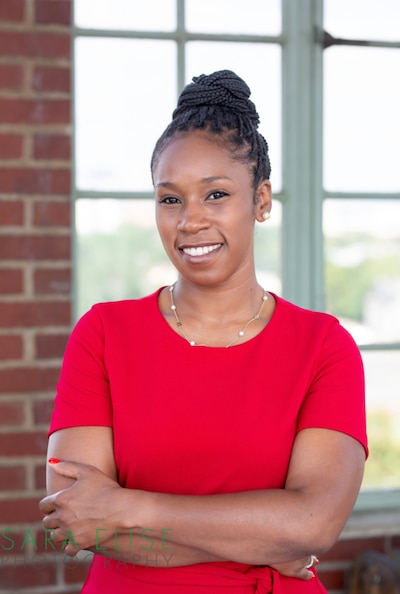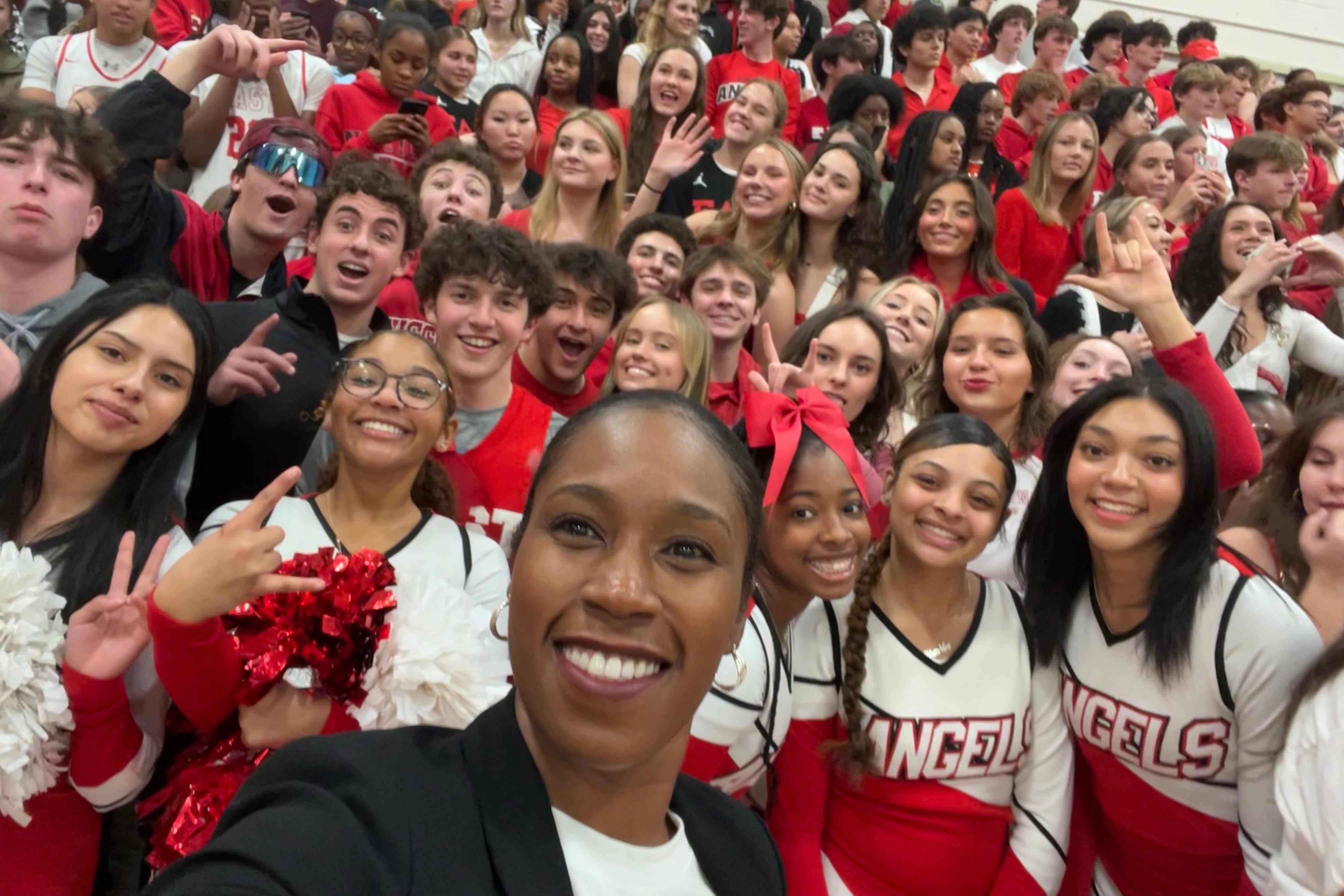Sign up for Chalkbeat Colorado’s free daily newsletter to get the latest reporting from us, plus curated news from other Colorado outlets, delivered to your inbox.
When Terita Walker was a middle schooler at Beasley Academic Center in Chicago, she remembers watching in awe as her principal, Ollie McLemore, hosted Bill Clinton at the school during his first presidential campaign in 1992.
When McLemore presented Clinton with a bright green Beasley Bees sweatshirt, the candidate quickly jettisoned his suit jacket and put it on, drawing an explosion of cheers from students, parents, and teachers. The future president described the K-8 magnet school as “a model for what we wish all schools would be.” He later invited McLemore to inauguration events as one of “50 Faces of Hope,” a group of inspiring people he’d met on the campaign trail.
Today, Walker is principal of Denver’s East High School, which serves about 2,300 students in one of the district’s grandest old buildings. She looks back on McLemore and the other educators who molded her as exemplars of educational leadership.

“These were individuals who did not just lead — they inspired, they nurtured, and they expected the very best from us,” Walker said.
Today, she aims to follow in their footsteps.
Along with principals from Medford, New Jersey, and Ogden, Utah, Walker was recently named one of three finalists for the National High School Principal of the Year award from the National Association of Secondary School Principals. The winner will be announced on July 9.
Walker, who is also president-elect of the Colorado Association of Secondary School Principals, talked to Chalkbeat about why she changed careers, what she learned from a patient mother, and how she thinks about school safety after two deans were shot by an East High student in 2023.
This interview has been edited for length and clarity.
What was your first education job, and what sparked your interest in the field?
Education was actually a second career for me. After spending time in the corporate world, I realized I wasn’t fully inspired by the work. While in the midst of “figuring it out,” someone suggested that I try substitute teaching.
That suggestion led me back to a very familiar and special place: my alma mater, Beasley Academic Center, a K-8 magnet school. Beasley had given me some of the most memorable and meaningful moments of my life, and experiencing it as an educator sparked something in me.
I wanted to be just like the educators who shaped me. One of those incredible individuals was my 8th grade teacher from 1993, Barbara Lanair, who later became my teacher supervisor during graduate school.
How did your own school experiences impact you and shape your approach to being a principal?
I had great school experiences in the Chicago Public School system, and those experiences shaped my approach to being a principal.
All of my school principals were strong, intelligent, powerful, caring, and nurturing Black women. Many of my teachers were as well. They weren’t just educators; they were role models who embodied excellence in everything they did. They could command a room within seconds and hold the attention of students, staff, parents, and community members alike.
As a principal today, I try to embody that same visibility, advocacy, and connection with students, staff, and the community.
Tell us about a memorable time — good or bad — when contact with a student’s family changed your perspective or approach.
One memorable experience that really shifted my perspective happened during a meeting with a student and his mother. During our conversation, the student kept asking his mom, “Why? But why not?” To my surprise, she patiently responded to every single question. I remember sitting there thinking, “That is so disrespectful!”
Based on how I was raised, questioning an adult — especially asking “why” — was often seen as defiant. So in the moment, I jokingly said to the mom, “Whatever happened to the good old-fashioned answer from a parent of...‘Because I said so!’” She just gave a small shrug and left the building.
Later, a colleague who overheard the exchange pulled me aside, and we had a thoughtful conversation that completely changed the way I saw that moment. We talked about how important it is for students to feel empowered to ask questions, to be curious, and to seek understanding. Those “why” questions are not about being disrespectful — they’re about learning how to think critically, form opinions, and challenge what doesn’t align with their values.
That conversation led me to call the student’s mother — not just to apologize, but to thank her. I told her how much I admired the way she calmly engaged with her child’s questions, and how her approach taught me something important about the kind of learners we’re trying to cultivate.
Since then, I’ve learned not to take it personally when students don’t simply accept what I say at face value. Of course, there’s always room for respect and boundaries, but now I see inquisitiveness and curiosity as strengths.
The East High community went through a lot in 2023, with multiple shootings on or near campus. How do you make students and staff feel safe?
Safety is a shared responsibility at East. Teachers, administrators, and staff members actively monitor transitions, manage hallway and outdoor movement, and stay vigilant throughout the day. Our safety team treats every report with urgency and care.
Following the incredibly difficult events of 2023, our commitment to safety has only deepened. One of the most important things we’ve learned is that safety is not just about procedures or physical security; it’s about trust, communication, and shared responsibility. That’s why we involve our entire school community in safety conversations before implementing new measures.
We’ve increased the number of campus safety officers in the building to ensure a visible presence and maintain consistent coverage throughout the hallways and around the perimeter of the school. We’ve also strengthened our relationship with the two Student Resource Officers. Our goal is for these officers to be trusted members of our school community who students and staff feel comfortable approaching.
You host monthly coffee chats with parents and students. What’s an example of something you learned from those discussions, and how you addressed it?
These monthly chats give me a chance to hear directly from students and families about what’s working and what isn’t. I want everyone to love our school, because why not? It’s an amazing place to be! But I also understand how important it is to remain open, reflective, and committed to growth.
One specific example came up first semester when parents expressed frustration over a lack of direct communication regarding student absences. The district had recently introduced a new electronic absence reporting system, but it wasn’t meeting all of our families’ needs.
After that coffee chat, we reached out to more families to better understand the issue. As a result, we hired a new attendance support staff member to bring back the human element. This person is now a direct point of contact for parents who need to report absences, ask questions, or resolve issues. Since making that shift, we’ve received positive feedback about the improved clarity and responsiveness of our attendance process.
What issue in the education policy realm is having a big impact on your school right now? How are you addressing it?
One of the most pressing issues impacting our school is the growing need to support student mental health and well-being. At East High School, we recognize that mental health support is not a luxury — it is a necessity.
Despite significant efforts and investments, the need continues to outpace available support. East High has the largest school counseling team in the district, yet our counselors still carry caseloads larger than the national average. We also have four full-time psychologists and three social workers on staff, and we regularly collaborate with outside agencies, like WellPower and Denver Health.
In the face of recent funding cuts, East made a deliberate decision to retain a full-time prevention and therapeutic specialist. This individual educates students on the effects of drugs and alcohol and leads both preventative programming and intervention workshops as part of a restorative disciplinary approach.
What’s the best advice about educational leadership that you ever received?
The best advice didn’t come in the form of a direct conversation. It came during one of the most challenging periods of my career: the post-COVID era. My leadership team and I were exploring the implementation of an advisory period. After countless hours of research and brainstorming, we found ourselves overwhelmed and exhausted.
Then, almost by accident, I stumbled across a graphic that simply read: “Everything is Figureoutable.”
At the time, it felt more like wishful thinking than truth. But that phrase stuck with me. I later discovered it was the title of a book by Marie Forleo. Her message is simple but profound: with enough effort, determination, and creativity, any problem can be solved.
What are you reading for enjoyment?
I’m finishing “The Let Them Theory” by Mel Robbins, and I’ve also started listening to the accompanying podcast. The book and podcast have really inspired me with their constant reminders about the importance of choosing joy and staying grounded.
One of my favorite quotes from Mel Robbins is: “There will always be someone who can’t see your worth. Don’t let it be you.” It’s a powerful reminder to stay true to myself, to lead with confidence, and to never lose sight of my own value — especially in a profession like education, where we pour so much of ourselves into others.
Ann Schimke is a senior reporter at Chalkbeat, covering early childhood issues and early literacy. Contact Ann at aschimke@chalkbeat.org.








